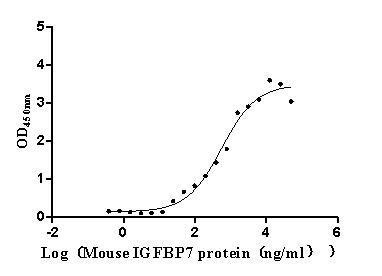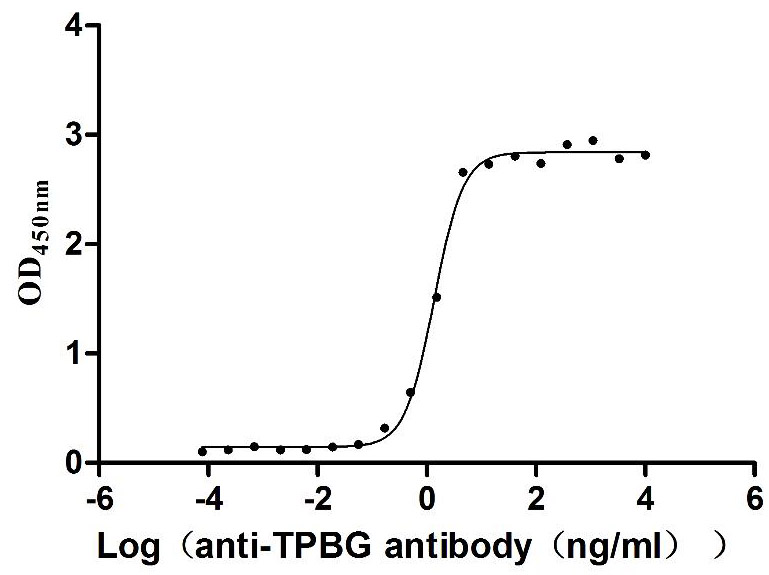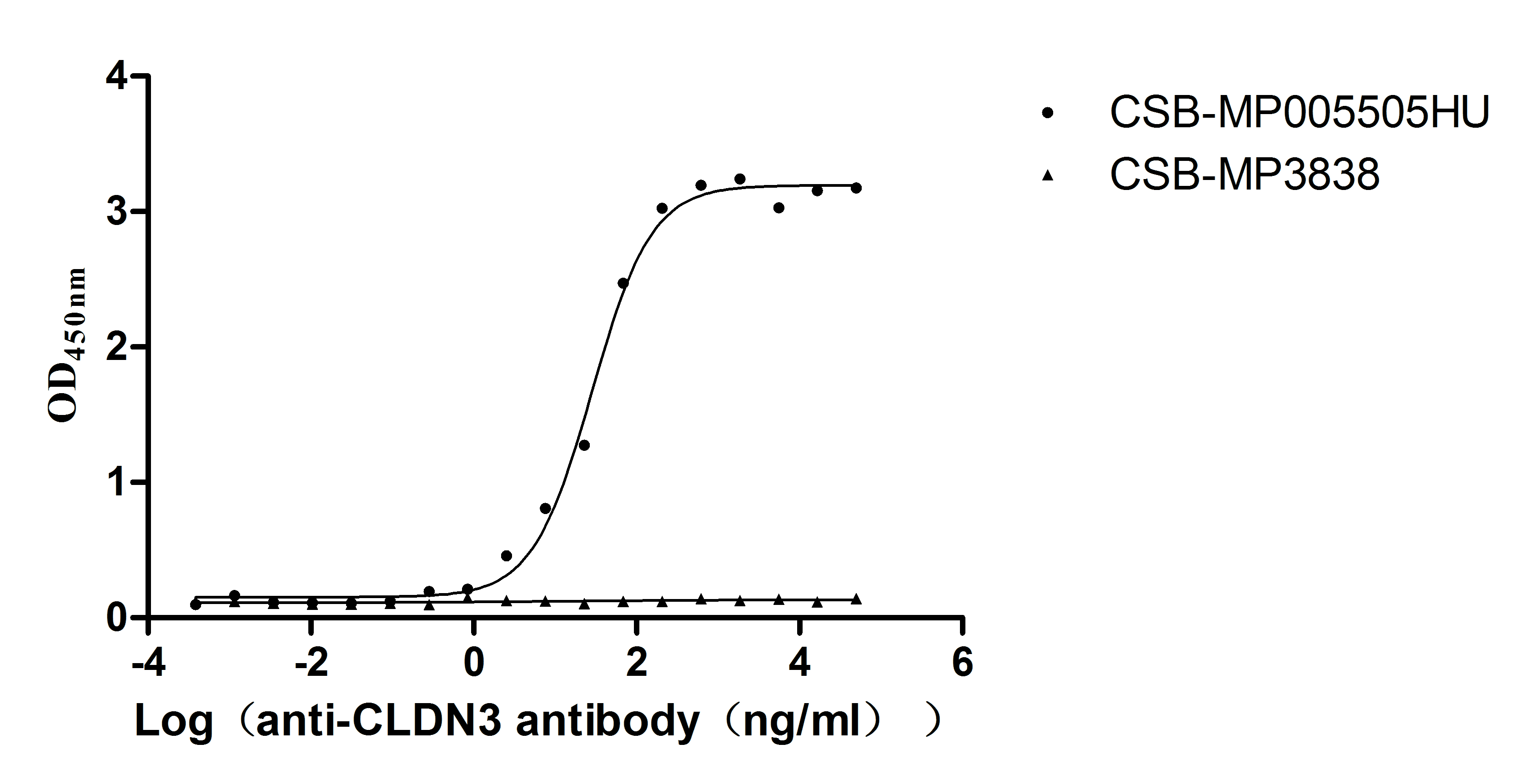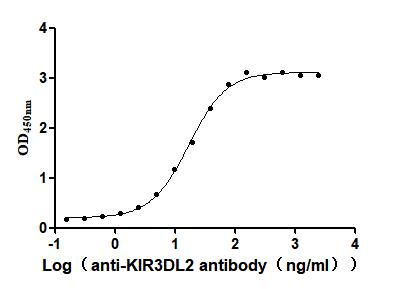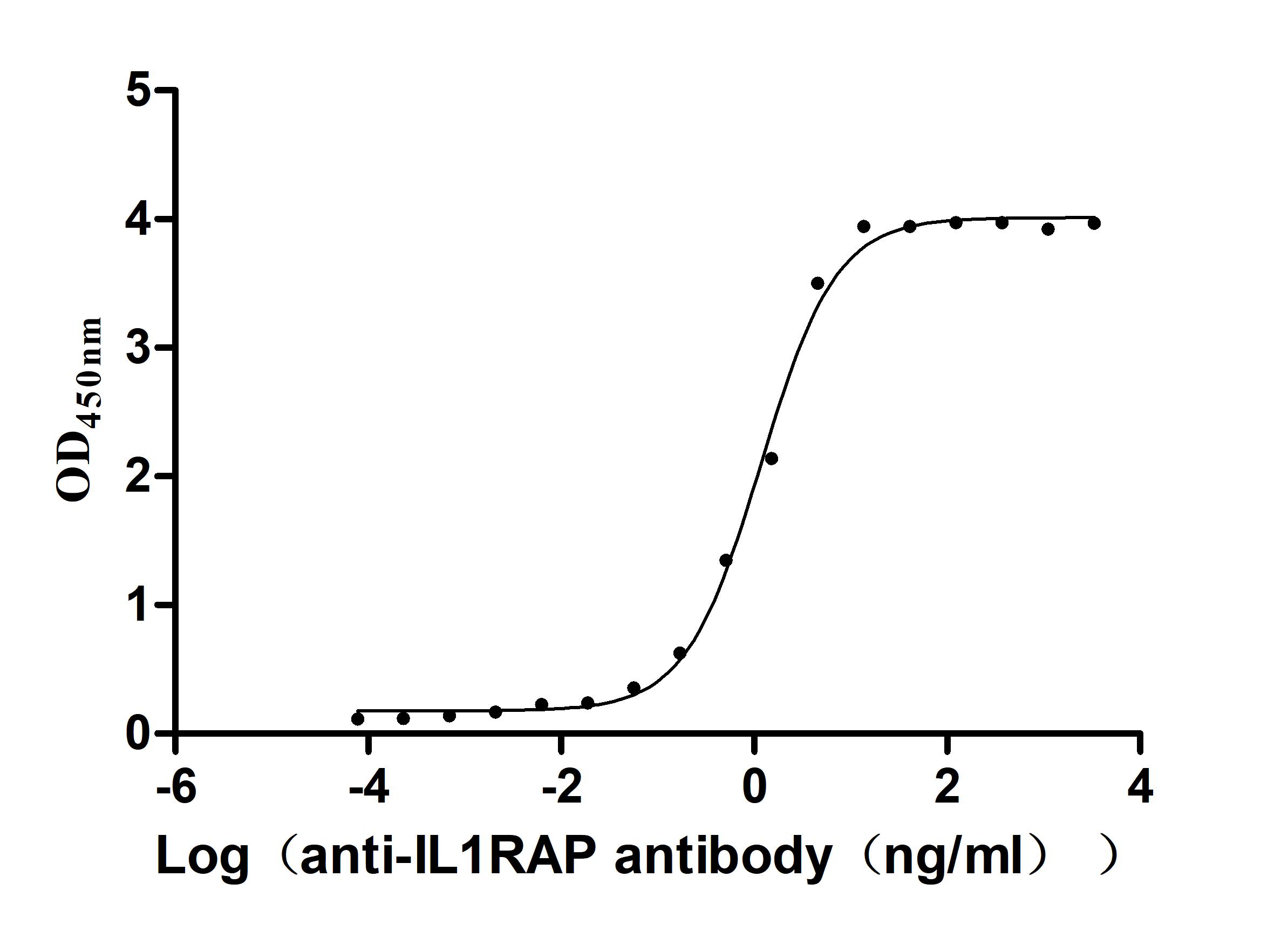Recombinant Mouse Glycogen synthase kinase-3 alpha (Gsk3a)
-
中文名称:小鼠Gsk3a重组蛋白
-
货号:CSB-YP649920MO
-
规格:
-
来源:Yeast
-
其他:
-
中文名称:小鼠Gsk3a重组蛋白
-
货号:CSB-EP649920MO
-
规格:
-
来源:E.coli
-
其他:
-
中文名称:小鼠Gsk3a重组蛋白
-
货号:CSB-EP649920MO-B
-
规格:
-
来源:E.coli
-
共轭:Avi-tag Biotinylated
E. coli biotin ligase (BirA) is highly specific in covalently attaching biotin to the 15 amino acid AviTag peptide. This recombinant protein was biotinylated in vivo by AviTag-BirA technology, which method is BriA catalyzes amide linkage between the biotin and the specific lysine of the AviTag.
-
其他:
-
中文名称:小鼠Gsk3a重组蛋白
-
货号:CSB-BP649920MO
-
规格:
-
来源:Baculovirus
-
其他:
-
中文名称:小鼠Gsk3a重组蛋白
-
货号:CSB-MP649920MO
-
规格:
-
来源:Mammalian cell
-
其他:
产品详情
-
纯度:>85% (SDS-PAGE)
-
基因名:
-
Uniprot No.:
-
别名:Gsk3a; Glycogen synthase kinase-3 alpha; GSK-3 alpha; EC 2.7.11.26; Serine/threonine-protein kinase GSK3A; EC 2.7.11.1
-
种属:Mus musculus (Mouse)
-
蛋白长度:Full Length of Mature Protein
-
表达区域:2-490
-
氨基酸序列SGGGPSGGG PGGSGRARTS SFAEPGGGGG GGGGGPGGSA SGPGGTGGGK ASVGAMGGGV GASSSGGGPS GSGGGGSGGP GAGTSFPPPG VKLGRDSGKV TTVVATVGQG PERSQEVAYT DIKVIGNGSF GVVYQARLAE TRELVAIKKV LQDKRFKNRE LQIMRKLDHC NIVRLRYFFY SSGEKKDELY LNLVLEYVPE TVYRVARHFT KAKLITPIIY IKVYMYQLFR SLAYIHSQGV CHRDIKPQNL LVDPDTAVLK LCDFGSAKQL VRGEPNVSYI CSRYYRAPEL IFGATDYTSS IDVWSAGCVL AELLLGQPIF PGDSGVDQLV EIIKVLGTPT REQIREMNPN YTEFKFPQIK AHPWTKVFKS SKTPPEAIAL CSSLLEYTPS SRLSPLEACA HSFFDELRRL GAQLPNDRPL PPLFNFSPGE LSIQPSLNAI LIPPHLRSPA GPASPLTTSY NPSSQALTEA QTGQDWQPSD ATTATLASSS
-
蛋白标签:Tag type will be determined during the manufacturing process.
The tag type will be determined during production process. If you have specified tag type, please tell us and we will develop the specified tag preferentially. -
产品提供形式:Lyophilized powder
Note: We will preferentially ship the format that we have in stock, however, if you have any special requirement for the format, please remark your requirement when placing the order, we will prepare according to your demand. -
复溶:We recommend that this vial be briefly centrifuged prior to opening to bring the contents to the bottom. Please reconstitute protein in deionized sterile water to a concentration of 0.1-1.0 mg/mL.We recommend to add 5-50% of glycerol (final concentration) and aliquot for long-term storage at -20℃/-80℃. Our default final concentration of glycerol is 50%. Customers could use it as reference.
-
储存条件:Store at -20°C/-80°C upon receipt, aliquoting is necessary for mutiple use. Avoid repeated freeze-thaw cycles.
-
保质期:The shelf life is related to many factors, storage state, buffer ingredients, storage temperature and the stability of the protein itself.
Generally, the shelf life of liquid form is 6 months at -20°C/-80°C. The shelf life of lyophilized form is 12 months at -20°C/-80°C. -
货期:Delivery time may differ from different purchasing way or location, please kindly consult your local distributors for specific delivery time.Note: All of our proteins are default shipped with normal blue ice packs, if you request to ship with dry ice, please communicate with us in advance and extra fees will be charged.
-
注意事项:Repeated freezing and thawing is not recommended. Store working aliquots at 4°C for up to one week.
-
Datasheet :Please contact us to get it.
靶点详情
-
功能:Constitutively active protein kinase that acts as a negative regulator in the hormonal control of glucose homeostasis, Wnt signaling and regulation of transcription factors and microtubules, by phosphorylating and inactivating glycogen synthase (GYS1 or GYS2), CTNNB1/beta-catenin, APC and AXIN1. Requires primed phosphorylation of the majority of its substrates. Contributes to insulin regulation of glycogen synthesis by phosphorylating and inhibiting GYS1 activity and hence glycogen synthesis. Regulates glycogen metabolism in liver, but not in muscle. May also mediate the development of insulin resistance by regulating activation of transcription factors. In Wnt signaling, regulates the level and transcriptional activity of nuclear CTNNB1/beta-catenin. Facilitates amyloid precursor protein (APP) processing and the generation of APP-derived amyloid plaques found in Alzheimer disease. May be involved in the regulation of replication in pancreatic beta-cells. Is necessary for the establishment of neuronal polarity and axon outgrowth. Through phosphorylation of the anti-apoptotic protein MCL1, may control cell apoptosis in response to growth factors deprivation. Acts as a regulator of autophagy by mediating phosphorylation of KAT5/TIP60 under starvation conditions, leading to activate KAT5/TIP60 acetyltransferase activity and promote acetylation of key autophagy regulators, such as ULK1 and RUBCNL/Pacer. Negatively regulates extrinsic apoptotic signaling pathway via death domain receptors. Promotes the formation of an anti-apoptotic complex, made of DDX3X, BRIC2 and GSK3B, at death receptors, including TNFRSF10B. The anti-apoptotic function is most effective with weak apoptotic signals and can be overcome by stronger stimulation.
-
基因功能参考文献:
- GSK-3 plays a significant role in astrocyte development and behavioral control in mice. PMID: 26179612
- Data suggest that, in embryonic stem cells, Gsk3b/Gsk3a phosphorylate splicing factors (Rbm8a, Srsf9, and Psf) and nucleolar proteins (Npm1 and Phf6); Gsk3b/Gsk3a are key to alternative splicing of close to 190 genes. (Gsk3 = glycogen synthase kinase-3; Rbm8a = RNA binding motif protein 8a; Srsf9 = splicing factor, arginine-serine-rich 9; Psf = replication protein Psf; Npm1 = nucleophosmin 1; Phf6 = PHD finger protein 6) PMID: 28916722
- GSK3 is regulated through mechanisms independent of N-terminal serine phosphorylation in order for beta-catenin to be stabilized. PMID: 27284979
- The expression of PI3K-insensitive GSK3 stimulates the production of adiponectin and protects from diet-induced metabolic syndrome. PMID: 27140617
- Cardiac myocyte GSK-3a is required to maintain normal cardiac homeostasis and loss leads to severe fatal dilated cardiomyopathy. PMID: 26976650
- reveals that GSK-3alpha- and GSK-3beta-regulated pathways can be responsible for stepwise transition to myelodysplastic syndromes and subsequent acute myeloid leukemia PMID: 26766591
- Gsk3 play a role in the maintenance of DNA methylation at a majority of the imprinted loci in embryonic stem cells PMID: 25833708
- Sperm GSK3A is essential for male fertility. PMID: 25568307
- The absence of oocyte GSK3 isoforms in the periconceptional period does not alter fertility yet causes offspring cardiac hyperplasia, cardiovascular defects, and significant neonatal death. PMID: 25833158
- results support the model that GSK3 activity status is regulated by the circadian clock and that GSK3 feeds back to regulate the molecular clock amplitude in the suprachiasmatic nucleus PMID: 25724980
- Gsk3-deleted neurons expressing upper layer markers exhibited striking migration failure in all areas of the cortex. PMID: 25073924
- PI3K/AKT-mediated inhibitory phosphorylation of GSK3 limits the regenerative outcome after peripheral nerve injury. PMID: 25078444
- double-knockout embryonic stem cells, as well as GSK-3beta(-/-) mouse embryonic fibroblast cells in which GSK-3alpha was knocked down to demonstrate that both isoforms of GSK-3, GSK-3alpha and GSK-3beta, are required for antiviral immune response. PMID: 26100021
- ER stress-PERK-GSK3alpha/beta signaling promotes proatherogenic macrophage lipid accumulation PMID: 25183803
- The two isoforms of GSK-3 are essential integrators of multiple developmental signals that act to maintain normal mammary gland function and suppress tumorigenesis. PMID: 25195860
- identify a key role for GSK3 alpha and beta in the regulation of sperm maturation and acrosomal exocytosis PMID: 25808536
- GSK3alpha plays a pro-atherogenic role, possibly by mediating the effects of endoplasmic reticulum stress in the activation of pro-atherogenic pathways in high fat diet-fed low density lipoprotein receptor-deficient mice PMID: 25451156
- Results show that GSK3alpha rather than GSK3beta is essential for bidirectional synaptic plasticity in the Schaffer collateral to CA1 synapse PMID: 25208523
- could play a crucial role in renal urine concentration PMID: 25608967
- results demonstrate that GSK3beta, but not GSK3alpha, negatively controls the neuronal differentiation of progenitor cells and that GSK3beta may act downstream of the mammalian target of rapamycin complex1 signaling pathway. PMID: 24397546
- Data show that microtubule actin crosslinking factor 1 (MACF1) determines neuronal positioning by regulating microtubule dynamics and mediating glycogen synthase kinase 3 (GSK-3) signaling during brain development. PMID: 25224226
- reducing GSK-3alpha expression in cardiomyocytes limits ventricular remodeling and preserves cardiac function post-MI. PMID: 25125302
- GSK-3-alpha inhibition causes large increases in TNF-alpha secretion by lipopolysaccharide-stimulated cells in the murine dorsal air-pouch model. PMID: 24803542
- Dysregulation of NMDA receptors by altered GSK-3 signaling may be a key pathophysiologic mechanism for Alzheimer's disease. PMID: 24094580
- GSK3alpha contributes to the pathological phosphorylation of protein Tau. PMID: 23705847
- GSK3alpha, GSK3beta, and MAPK13 were found to be the most active tau kinases, phosphorylating tau at all four epitopes. PMID: 23798682
- A completely novel role of protein kinase B/Akt and glucocorticoid inducible kinase (SGK) dependent GSK3alpha,beta phosphorylation is observed, i.e., the regulation of cytosolic Ca2+ concentration in dendritic cells. PMID: 23817039
- GSK-3alpha and GSK-3beta are required for the regulation of activity-dependent dendritic growth. PMID: 23470087
- GSK-3alpha is a critical regulator of mTORC1, autophagy, and aging. PMID: 23549082
- GSK3alpha mutants were viable, while GSK3beta mutants died after birth with a complete cleft palate. PMID: 23185619
- High brain levels of GSK3alpha and large fluctuations in its levels and phosphorylation in the juvenile and adolescent mouse brain raise. PMID: 23167932
- PKCalpha and Akt modulate platelet function by phosphorylating and inhibiting GSK3alpha/beta, thereby relieving the negative effect of GSK3alpha/beta on thrombin-mediated platelet activation. PMID: 23239877
- PKB/Akt and SGK sensitive phosphorylation of GSK3alpha,beta is a potent regulator of perforin expression and activation induced cell death in T lymphocytes. PMID: 22814108
- GSK3alpha formed a constitutive complex to phosphorylate and suppress AKT activation. PMID: 23142783
- Inhibition of the MEK1/ERK pathway mediates the hypertrophy suppression and cardiac dysfunction caused by GSK-3alpha overexpression in cardiac myocytes. PMID: 22904158
- The inhibitory phosphorylation of GSK3alpha on serine-21 was increased in hippocampus & cerebral cortex 30 & 60 min after intraperitoneal ketamine injection. Total levels of GSK3alpha were unaltered. Ketamine modulates its phosphorylation not expression. PMID: 21502951
- redundant functions of GSK-3alpha and GSK-3beta through phosphorylation of RelA at Thr-254 play a crucial role in early stages of chondrocyte differentiation. PMID: 22761446
- GSK3 inhibitor-BIO regulates proliferation of immortalized pancreatic mesenchymal stem cells PMID: 22384031
- data from both approaches suggest that GSK-3alpha contributes to both SP and NFT pathogenesis while GSK-3beta only modulates NFT formation. PMID: 22623685
- The cardioprotective effects of GSK-3alpha in the setting of ischemia and infarction appear to be substantial. PMID: 22086876
- lattice-binding activity mediates axon growth inhibition induced by suppression of GSK3 activity via preventing microtubule protrusion into the growth cone periphery PMID: 21937714
- Inhibition of glycogen synthase kinase-3 alleviates Tcf3 repression of the pluripotency network and increases embryonic stem cell resistance to differentiation. PMID: 21685889
- insulin-sensitization observed in the out-bred strain of mice lacking GSK-3alpha is mediated by indirect means that do not require intrinsic function of GSK-3alpha in skeletal muscle and liver tissues PMID: 21253590
- Study provides insights into both skeletal development and the biology of GSK-3alpha and GSk-3beta proteins. PMID: 21325041
- findings clearly implicate both GSK-3alpha- and GSK-3beta-dependent mechanism of neuronal pentraxin 1 induction PMID: 21130869
- These data support a role for the GSK-3alpha gene in central nervous system functioning and possible involvement in the development of psychiatric disorders. PMID: 19925672
- Phosphatidylinositol 3-kinase (PI3K) signaling via glycogen synthase kinase-3 (Gsk-3) regulates DNA methylation of imprinted loci Dnmt3a2, and misexpression of Igf2, H19, and Igf2r PMID: 21047779
- gastric acid secretion is significantly enhanced in mice expressing protein kinase B/serum-glucocorticoid regulated kinase-insensitive GSK3a,b, disclosing a novel signaling molecule involved in the regulation of gastric acid secretion PMID: 20552232
- The chronic remodelling response to infarction in hearts of GSK-3alpha/beta(Ala21/9) knockin (KI) mice encoding constitutively active GSK-3 isoforms, was determined. PMID: 20696171
- impaired inhibitory regulation of GSK3 in Fmr1 knockout mice may contribute to some socialization deficits PMID: 20300527
显示更多
收起更多
-
蛋白家族:Protein kinase superfamily, CMGC Ser/Thr protein kinase family, GSK-3 subfamily
-
数据库链接:
KEGG: mmu:606496
STRING: 10090.ENSMUSP00000071654
UniGene: Mm.491101
Most popular with customers
-
Recombinant Human Receptor tyrosine-protein kinase erbB-2 (ERBB2), partial (Active)
Express system: Mammalian cell
Species: Homo sapiens (Human)
-
Recombinant Human Nectin-4 (NECTIN4), partial (Active)
Express system: Mammalian cell
Species: Homo sapiens (Human)
-
Recombinant Human Angiopoietin-2 (ANGPT2) (Active)
Express system: Mammalian cell
Species: Homo sapiens (Human)
-
Recombinant Mouse Complement component C1q receptor (Cd93), partial (Active)
Express system: Mammalian cell
Species: Mus musculus (Mouse)
-
Recombinant Human Trophoblast glycoprotein (TPBG), partial (Active)
Express system: Mammalian cell
Species: Homo sapiens (Human)
-
Recombinant Human Claudin-3 (CLDN3)-VLPs (Active)
Express system: Mammalian cell
Species: Homo sapiens (Human)
-
Recombinant Human Killer cell immunoglobulin-like receptor 3DL2 (KIR3DL2), partial (Active)
Express system: Mammalian cell
Species: Homo sapiens (Human)
-
Recombinant Human Interleukin-1 receptor accessory protein (IL1RAP), partial (Active)
Express system: Mammalian cell
Species: Homo sapiens (Human)


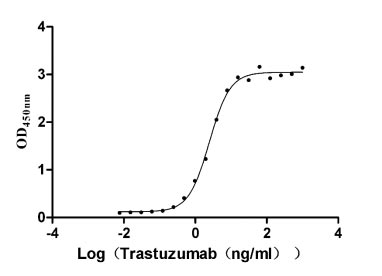
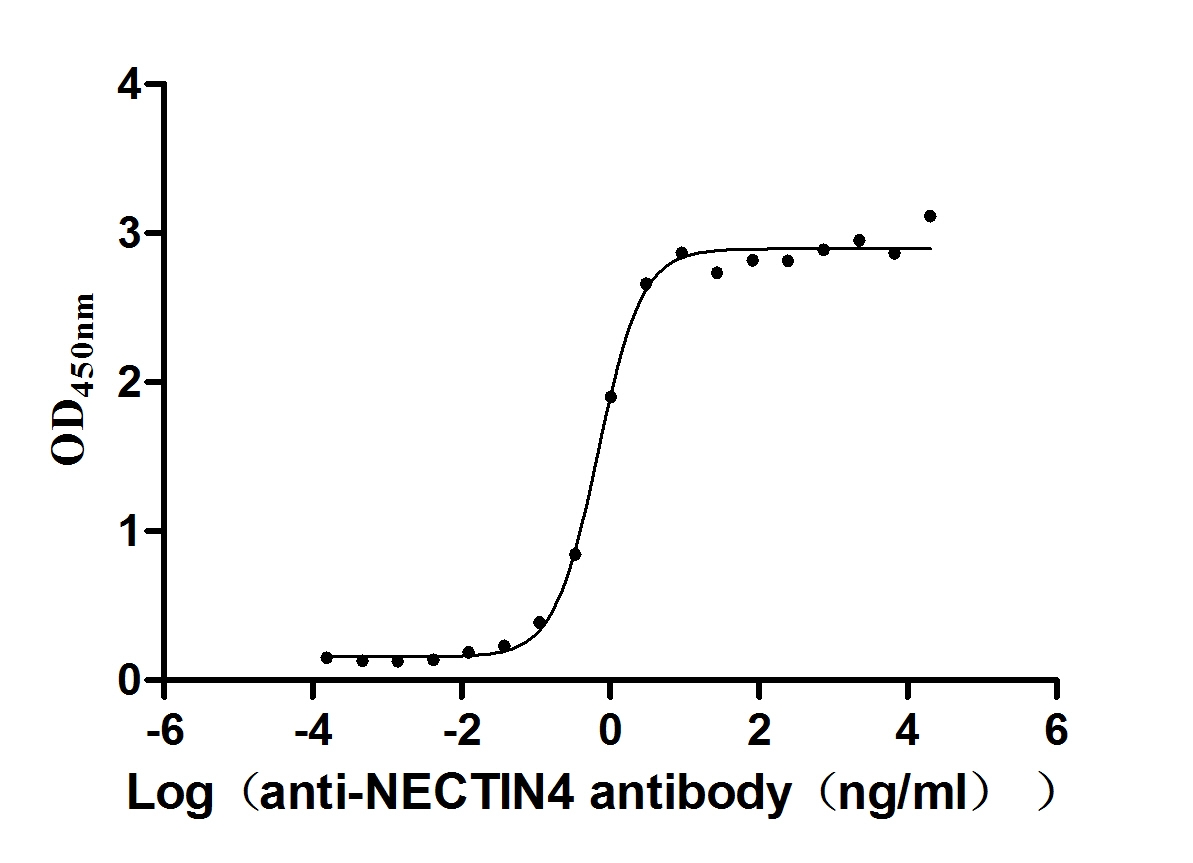
-AC1.jpg)
